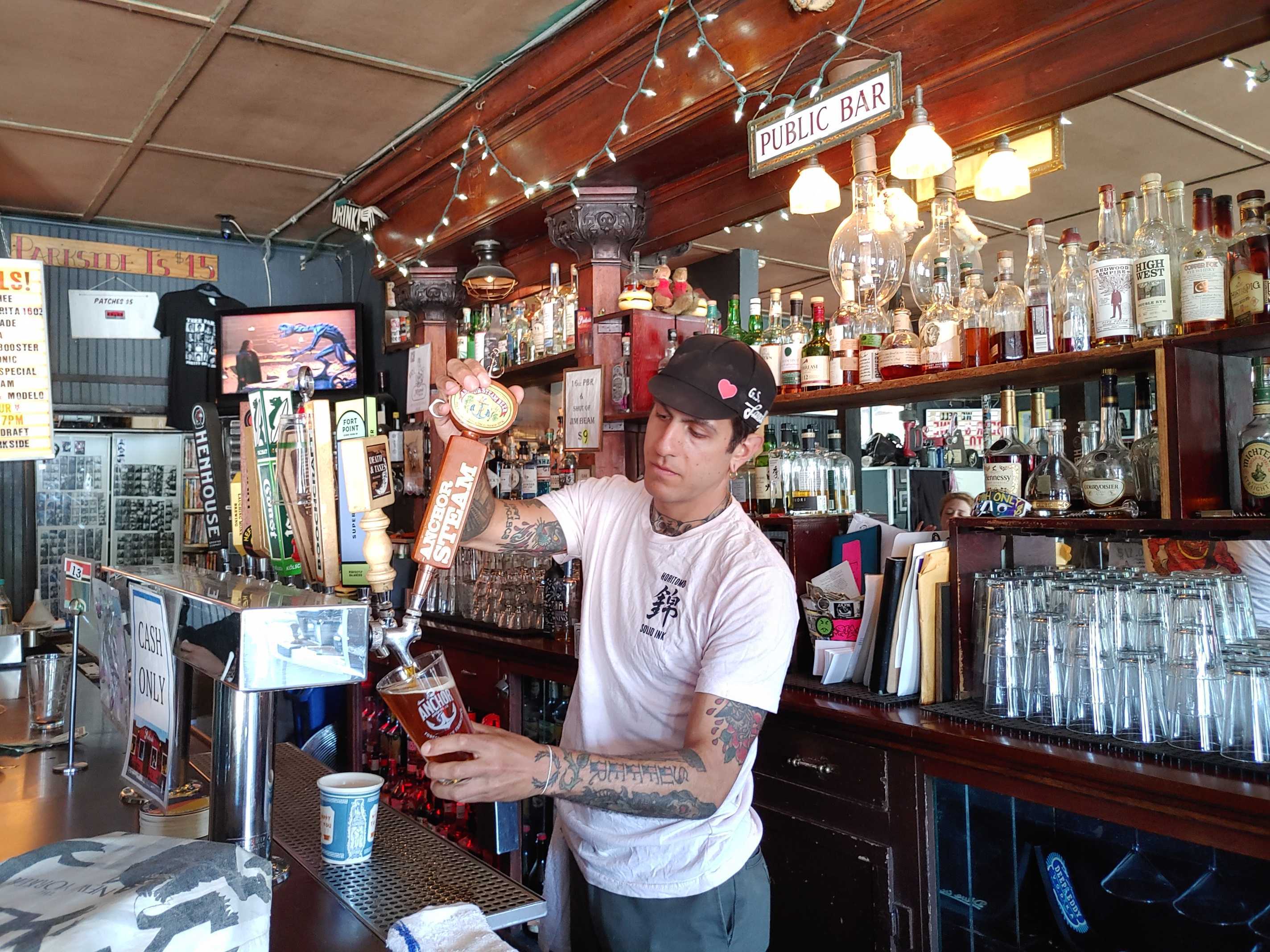After 127 years in business and surviving two world wars, two major earthquakes, the Great Depression and the Great Recession, Anchor Brewing announced Wednesday it was ceasing operations. Bartenders, brewery owners and beer drinkers in San Francisco are lamenting the loss.
Cole Valley resident Kevin Coffey said losing Anchor was like losing a piece of the city.
“In people’s minds, it represents San Francisco,” Coffey said. “It’s like a little bit of San Francisco every time you walk into a bar.”
Anchor Brewery tour guide Thomas Delany was laid off along with many other workers Wednesday when parent company Sapporo Holdings Limited announced the brewery’s closure. He was devastated.
“It’s an SF institution,” said Delany, a San Francisco native. “I’m not just losing a job; I’m losing friends.”
But while enduring the loss of an iconic San Francisco beer, many said they couldn’t help but feel that the brewery was doomed.
‘So Much Easier Now To Get Something Local’
The loss of Anchor is made less painful, beer drinkers said, by a robust craft brewing scene, one that may have killed the longtime beer company.
“It’s sad, but I don’t mind too much,” Evan Jaundzems said as he sat in Thee Parkside, just blocks from the brewery’s tap room, sipping a pint of Death and Taxes. “There’s so many kinds of craft beers. It seems really inundated.”
Sapporo said the local craft brewing scene helped usher in Anchor’s demise but claimed that several other factors had also killed the brewery, including the growing popularity of hard seltzers and liquor and a pandemic-related loss of sales at bars and restaurants, where Anchor sold 70% of its beer, according to spokesperson Sam Singer. The Japanese brewing conglomerate purchased Anchor Brewing Company in 2017.
“Bottom line, Anchor ran out of money, and it ran out of time because of the negative economic impacts of the pandemic,” Singer said.
The Brewers Association, which represents craft breweries nationwide, said the large craft brewing scene stands on the shoulders of Anchor. The trade association also said rising costs make it difficult for breweries to survive.
“Anchor’s contributions to craft brewing and American beer history cannot be overstated,” said Brewers Association Chief Economist Bart Watson.
“Personally, and speaking for the Bay Area Brewers Guild collectively, [Wednesday’s] news about Anchor closing is incredibly sad,” said Joanne Marino, executive director of the guild. “Anchor single-handedly revived craft beer as we know it here in the states, has been an inspiration for craft brewers everywhere and, for over a century, a beacon for San Francisco’s brewing scene.”
There were 9,235 craft breweries operating at the end of 2022 in the U.S., including 1,979 microbreweries, 3,275 brewpubs, 3,723 taproom breweries and 258 regional craft breweries, according to the Brewers Association.
The New Label
Several bartenders and customers who spoke to The Standard on Wednesday said another death knell for Anchor came in the form of a controversial 2021 rebrand that changed the label on bottles and cans of Anchor beers from its classic logo—which had remained largely unchanged since the 1970s—to the current one, which some said was reminiscent of Twisted Tea or IKEA logos. The rebrand was a Sapporo decision to appeal to a wider consumer base that also alienated some Anchor beer fans.
“When they changed the logo, it seemed like a desperate attempt to change the situation,” said Dexter Woods, sipping a Miller at Potrero Hill’s Connecticut Yankee bar. “Sometimes, I’ll just get an Anchor Steam out of nostalgia.”
“It looked like Twisted Tea,” said Phil Emerson, co-founder of craft brewery Olfactory Brewery in San Francisco’s Dogpatch neighborhood, a few blocks from Anchor’s headquarters.
Former Anchor workers agreed.
“The fuck-ups are public record at this point,” Delany said. “It started with the label change.”
Countering, Singer said the rebrand sparked a great deal of renewed interest and increased sales slightly but failed to make up for losses during Covid.
Who’s Drinking Anchor Steam?
Demand for Anchor beer varied greatly across the bars visited by The Standard on Wednesday.
Staff at Thee Parkside said they rarely serve Anchor beer. Indeed, none of the customers present during the visit were drinking Anchor Steam.
In contrast, bartenders at the nearby Connecticut Yankee said it goes through more than 100 gallons of Anchor per week, although that bar has been popular with Anchor staff, they said.
“Everybody drinks it,” said Connecticut Yankee bartender Katrina Wallace. “We go through two [55-gallon] kegs a week.”
Thee Parkside bartender Matt Butcher said he remembers more people drinking Anchor Steam when he first moved to San Francisco in 2009 than they do now and growing local craft brewery options have eaten away at Anchor’s market share.
“It was like the brewer’s beer,” Butcher said. “It’s a good beer, and you gotta hold down the local brewery.”
So it is no surprise to Butcher that he hasn’t seen people rushing into his bar to drink the now-scarce Anchor Steam it has on tap.
“I haven’t noticed any change,” Butcher said.
Hopes for a Buyer
“I would be shocked if we didn’t see this come back,” said Ben Bleiman, founder of the SF Bar Owner Alliance, head of the city’s Entertainment Commission and owner of Mission District’s Teeth bar and Captain Jack’s liquor store in Nob Hill. “I could maybe see someone midsized like Sierra Nevada, or even someone local, buying it.”
The California Brewers Association, which represents craft brewers around California, declined to comment.
